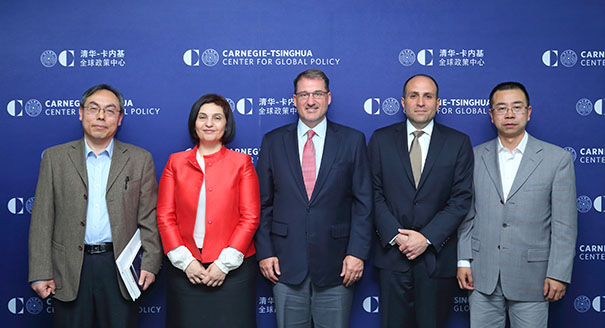Registration
You will receive an email confirming your registration.
The Middle East continues to be an important source of security concerns as well as economic interests for the United States and China, yet the region stands precariously at the edge of conflict. The instability brought by the ongoing Syrian conflict, Yemeni war, and stalled Israeli-Palestinian peace process has been compounded by President Trump’s unconventional approach to U.S. foreign policy, evidenced by his plan to decertify the Iran nuclear deal and move the U.S. Embassy in Israel to Jerusalem. Meanwhile, China continues to deepen its footprint in the region through efforts such as the Belt and Road Initiative and the Shanghai Cooperation Organization to advance its energy and economic interests.
Carnegie–Tsinghua Center Director Paul Haenle moderated a discussion between Carnegie scholars and scholars from Peking University’s School of International Studies on current political and economic trends in the Middle East and the implications for China’s regional diplomacy.
This panel was the fourth of the Carnegie Global Dialogue Series 2017-2018 and cosponsored by Peking University’s School of International Studies. This event was off the record.
DISCUSSION HIGHLIGHTS
- Chinese Neutrality in the Middle East Amid Growing Regional Tensions: The panelists discussed the implications and sustainability of China’s maintaining friendly ties with Middle Eastern countries. As China’s global economic power and business interests in the region increase, it will likely have to reassess its allegiances in the region and wider role in the international community, or face a possible backlash. China’s abstentions on UN Security Council resolutions, executed in order to appear neutral, are not necessarily perceived as such by other countries. Discussants noted that the promotion of stability in the region through commercial ties and economic development as part of the BRI could be misinterpreted in a region that, some argued, is characterized by multipolar zero-sum international relations.
China's Aversion to Externally-Induced Regime Change: One discussant pointed out that, due to its neutral regional stance and large global influence, China is in a unique position to get combative parties involved in the Syrian conflict–such as Russia, Turkey, and Iran–to the negotiating table. However, China is explicitly unwilling to support external intervention in the Syrian conflict. A panelist pointed out that China’s own development experience has led it to resist supporting regime change in foreign countries. While Chinese policy has gradually shifted since its late recognition of the National Transitional Council of Libya, China still prefers to support incumbent regimes rather than risk assuming responsibility in the case of chaotic political transitions.
Possible Scenarios for the Iran Nuclear Deal: In the event that the U.S. withdraws from the JCPOA, Iran’s response could affect existing U.S. alliances and, to some extent, its bilateral relationship with China. If, after the U.S. exits the deal, Iran continues to comply, Europe will be forced to pick between economic ties with Iran, to the detriment of transatlantic relations, and what they might see as unjustified sanctions. China and Russia, one panelist mentioned, were more important than European allies in implementing the deal. Resumed American-led sanctions on Iran, which China would be disinclined to accept, could increase tension between the US and China and affect future Chinese cooperation on the Iranian nuclear issue.
The Trump Administration’s Clashing Strategic Frameworks: One panelist mentioned that the U.S. seems to be pursuing a number of mutually incompatible policy frameworks in the Middle East. A simultaneous focus on counterterrorism, great power politics, and isolationism is not only self-defeating but also sends mixed signals and complicates regional dynamics. As the U.S. puts forth confused policy objectives and slowly relinquishes its leadership role in the region, China will have the opportunity to further enlarge its influence in the Middle East.
Increasing Potential for Conflict Escalation: The growing influence of great power politics, coupled with increasing social dissatisfaction among Middle Eastern youth, could result in the escalation of the Syrian conflict and several other disputes across the region. Panelists commented that heightened competition between regional powers like Saudi Arabia and Iran, along with the expansion of Turkish and Israeli zones of influence in Syria, could lead to the spread of violence to neighboring countries. One discussant commented that, though China perceives Egypt to be stable, President Sisi’s restrictions on civil society could lead already smoldering tensions in the country to explode.
Paul Haenle
Paul Haenle is the director of the Carnegie–Tsinghua Center for Global Policy based at Tsinghua University in Beijing. Haenle’s research focuses on Chinese foreign policy and U.S.-China relations.
Wang Suolao
Wang Suolao is an associate professor in the School of International Studies, Peking University.
Maha Yahya
Maha Yahya is director of the Carnegie Middle East Center, where her work focuses broadly on political violence and identity politics, pluralism, development and social justice after the Arab uprisings, the challenges of citizenship, and the political and socio-economic implications of the migration/refugee crisis.
Hu Yixiong
Hu Yixiong is an associate professor in the School of International Studies, Peking University.
Jarrett Blanc
Jarrett Blanc is a senior fellow in the Geoeconomics and Strategy Program at the Carnegie Endowment for International Peace.
